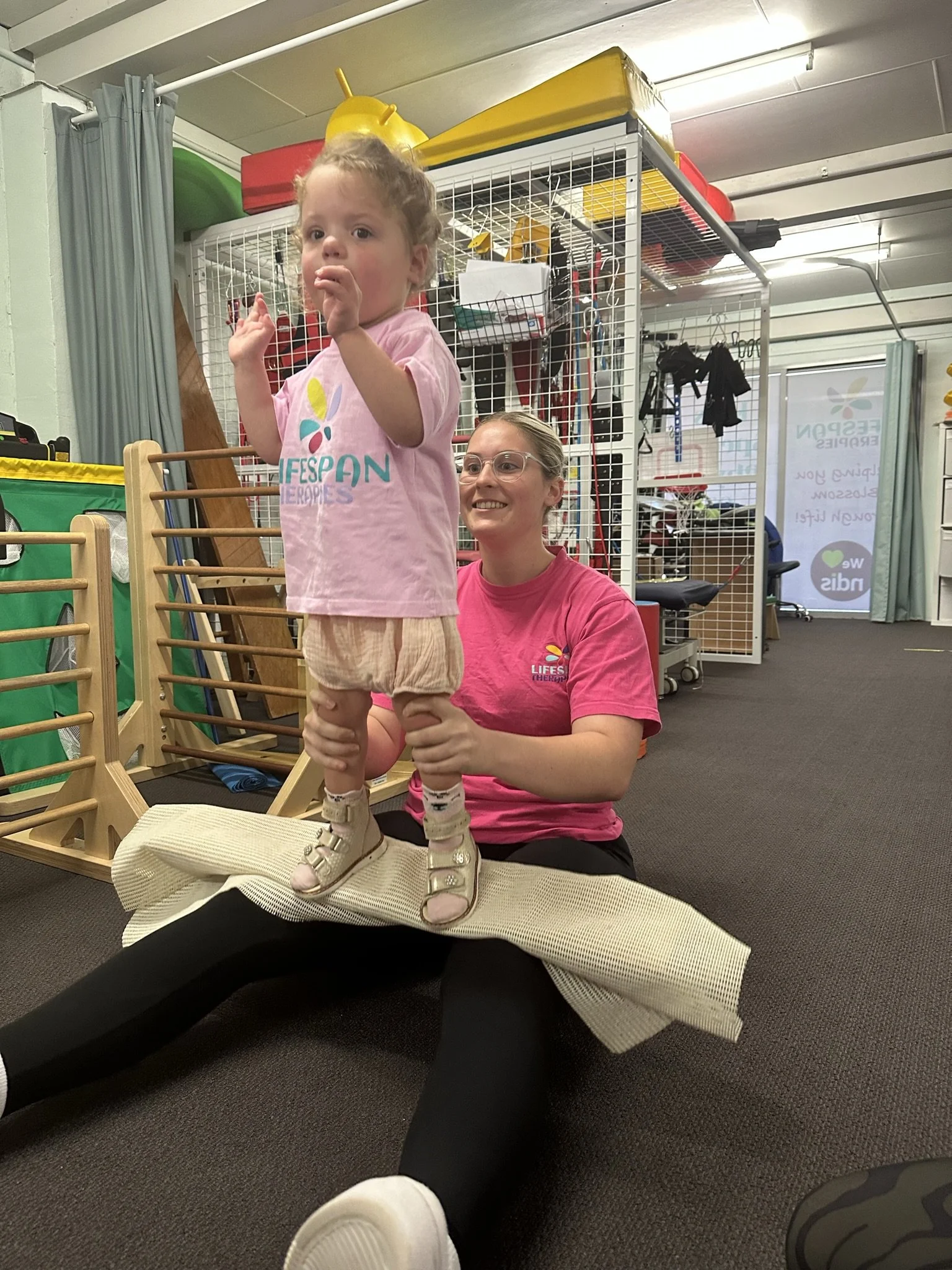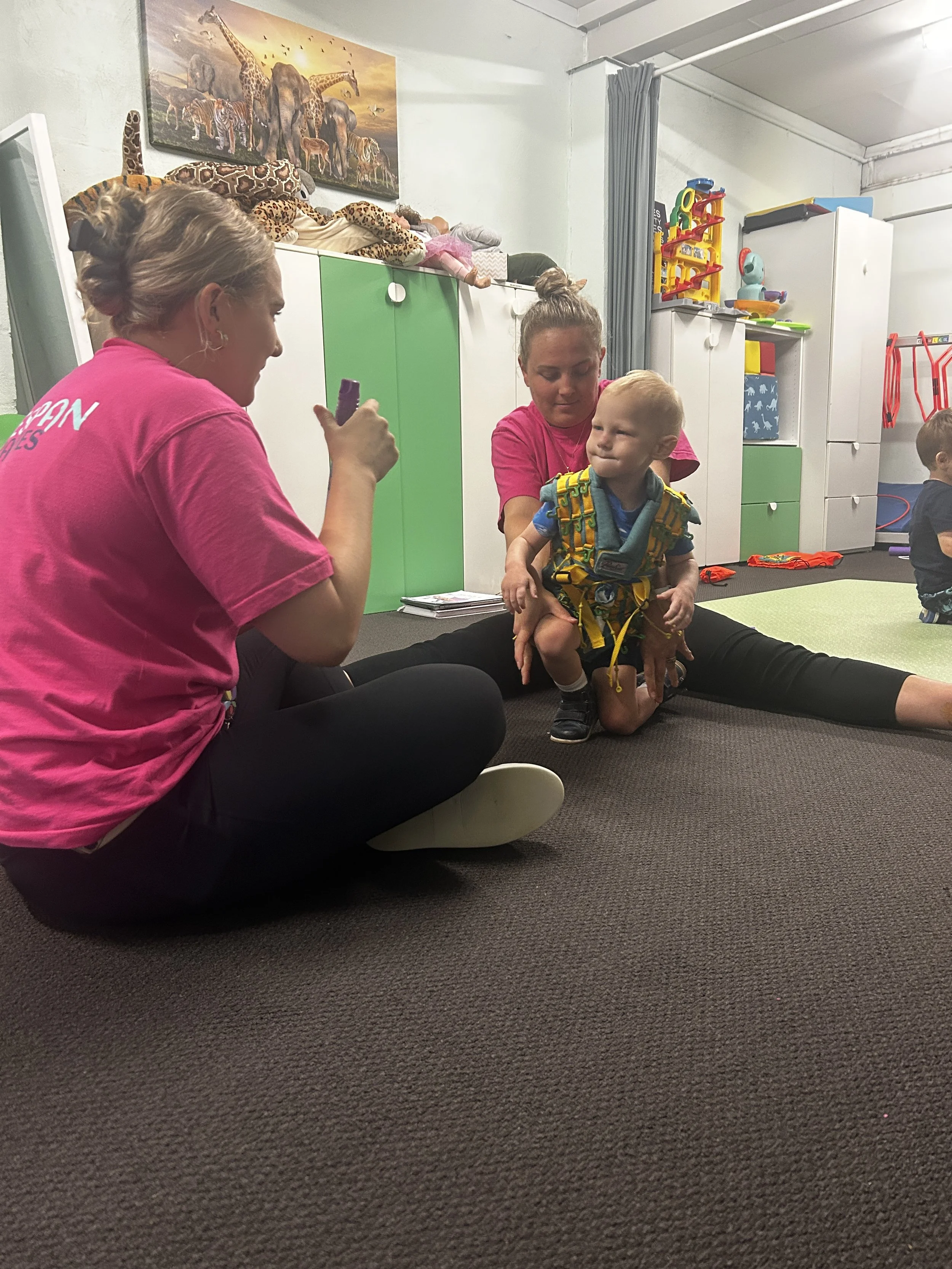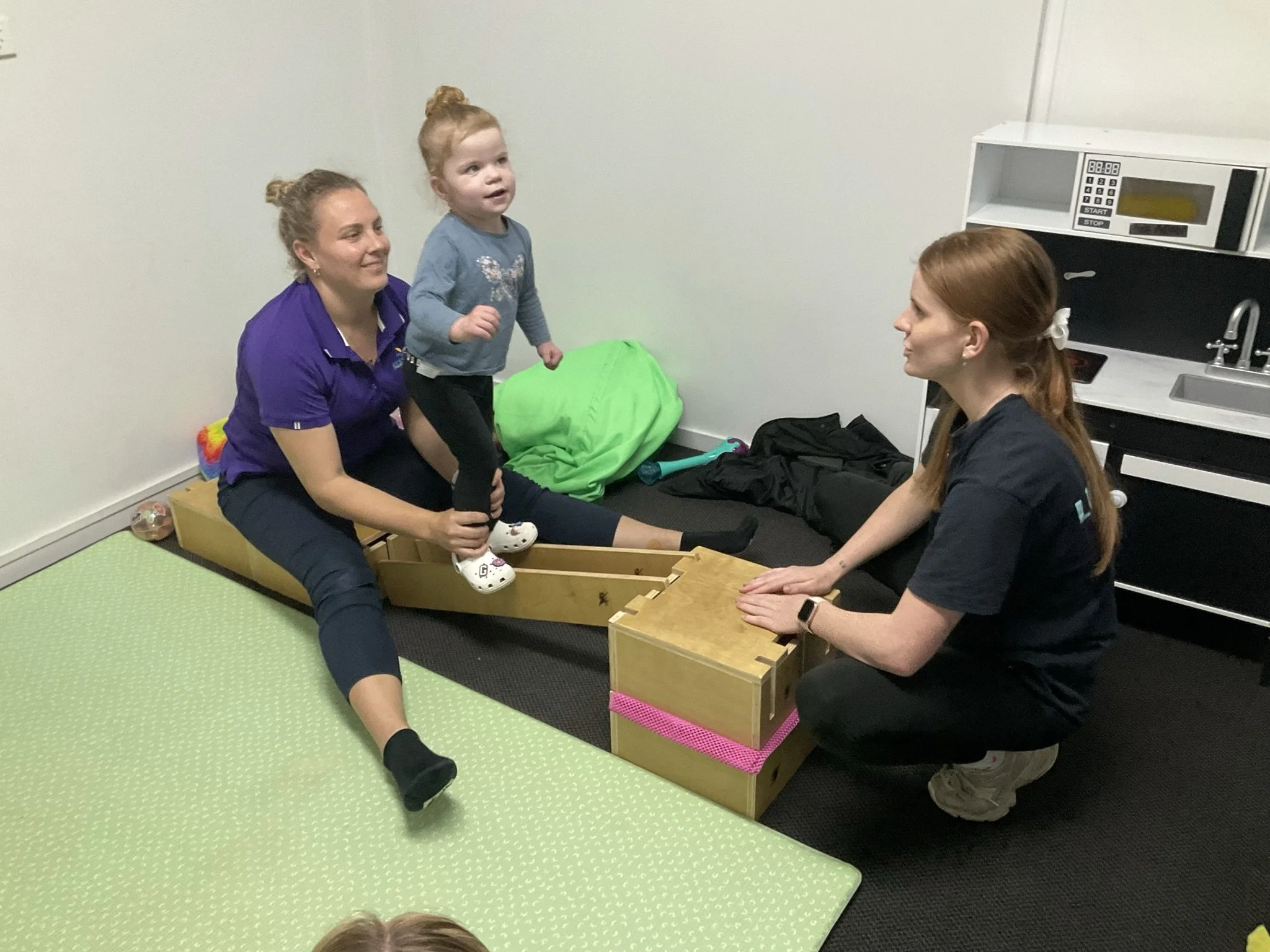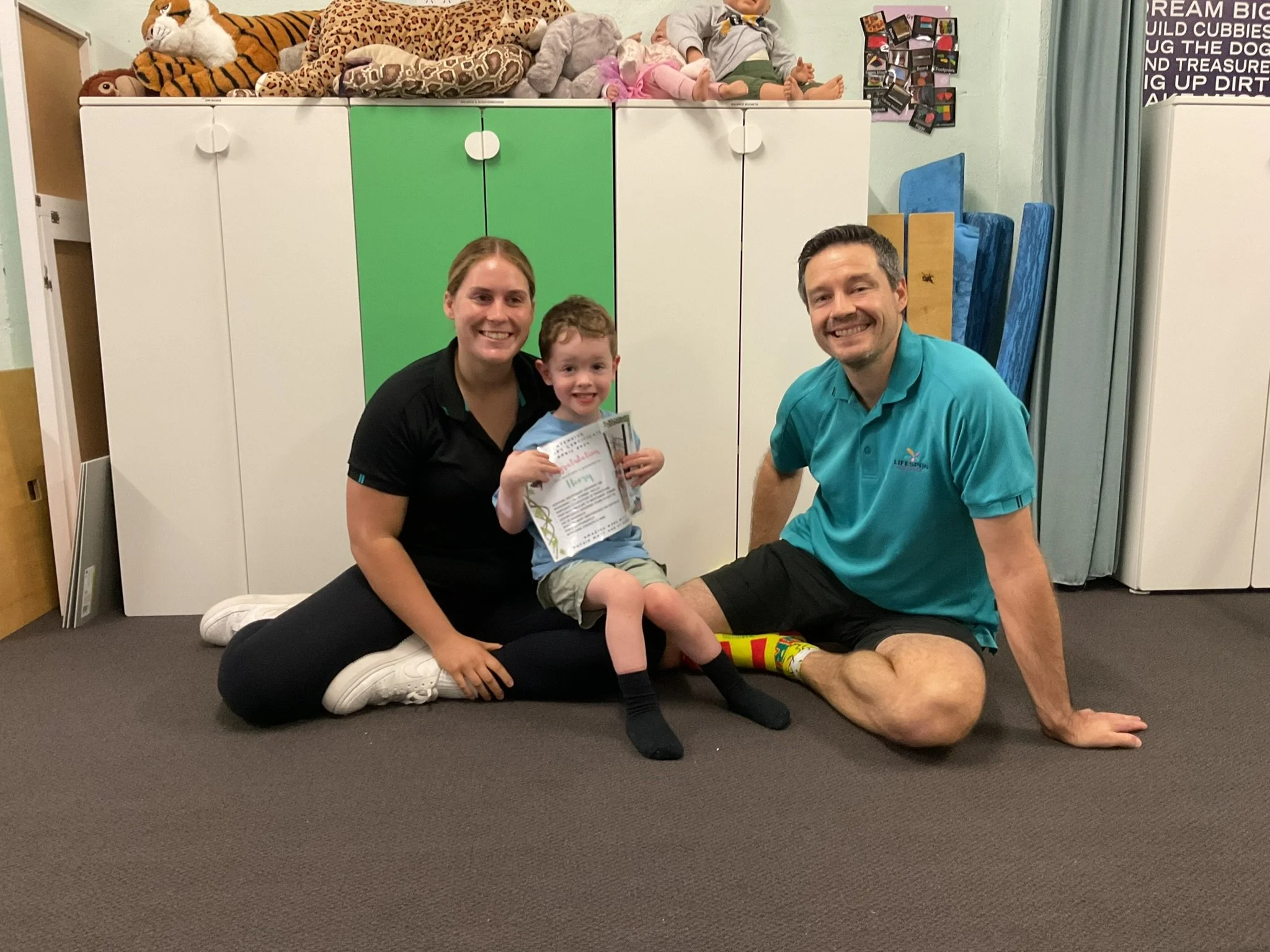
Intensive Therapy
Paediatric Allied Health
Empowering children through targeted, intensive care
At Lifespan Therapies, we understand the unique challenges faced by children with disabilities. Our Intensive Therapy programs are designed to provide comprehensive, tailored support to help your child reach their full potential. This program is specifically crafted for children who benefit from fast-tracked therapy to make significant progress in their physical development. Intensive therapy blocks are designed to harness the brain’s ability to change and adapt through neuroplasticity. By providing consistent and focused practice over a short period, these programs can lead to significant improvements in functional skills, independence, and overall quality of life for children with disabilities.
We have clients working on:
Eating a meal themselves
Improving their ability to get dressed
Sitting by themselves
Walking
Transferring
Using stairs
Standing up
Intensive Therapy involves a structured, high-frequency schedule of therapy sessions, typically 2-3 hours a day for 2-3 weeks depending on the child’s needs. This approach allows for a concentrated effort to address specific goals and challenges, providing the opportunity for quicker and more noticeable improvements. Intensive therapy harnesses the concepts of Neuroplasticity and physiological benefits of high-volume training to achieve lasting results. Sessions are not easy, they are full of sweat, hard work and tears but the excitement in a child’s face when they unlock a new skill is priceless and worth it all.
What are the benefits of Intensive Physiotherapy?
Focused Approach: With more frequent sessions, our therapists can closely monitor progress and make immediate adjustments to the therapy plan, ensuring that each session is highly effective.
Goal-Oriented: Intensive therapy is designed to target specific areas of need, leading to faster achievement of developmental milestones.
Accelerated Progress
Strength and Coordination: Through repetitive and varied exercises, children can improve their strength, coordination, and motor skills, which are crucial for everyday activities.
Functional Independence: As motor skills improve, children gain more independence in activities of daily living, contributing to a higher quality of life.
Enhanced Motor Skills
Individualised Plans: Each intensive program is tailored to your child’s unique needs, with goals set in collaboration with you and our experienced therapists, using an extensive array of techniques and therapy interventions we have at our disposal.
Holistic Support: We take a holistic approach, considering not only physical needs but also emotional and social factors that contribute to your child’s wellbeing.
Personalised Therapy
Increased Motivation
Visible Results: The rapid progress seen in intensive programs can boost your child’s motivation and confidence, encouraging continued effort and engagement in therapy.
Positive Environment: Our compassionate and supportive team creates a nurturing environment where your child feels safe and motivated to strive for their goals.
The role of neuroplasticity in Intensive Therapy
One of the key principles behind our Intensive Therapy program is the concept of neuroplasticity—the brain’s remarkable ability to reorganise itself by forming new neural connections. The brain is able to change itself, developing new connections, remap and create new pathways around an area of damage to achieve success. “Cells that fire together, wire together” and through repeated use of new circuits, these pathways become stronger and more efficient to allow for skill achievement, execution and retention for long term gains. Neuroplasticity plays a crucial role in how children with disabilities learn and develop new skills, especially in an intensive therapy setting.
Why 3 hours a day for 3 weeks?
Research has shown that consistent, focused therapy over a period of time can significantly enhance neuroplasticity.
By engaging in therapy for 3 hours a day over the course of 3 weeks, we provide the brain with the repeated and varied stimuli it needs to create and strengthen new neural pathways.
Reinforcing Learning
Repetition is key in neuroplasticity. The more a child practices a movement or skill, the more the brain reinforces the neural pathways associated with that action, leading to improved motor function.
Maximizing Progress
The intensity and duration of these sessions are designed to push the boundaries of your child’s current abilities, promoting faster progress and helping to achieve significant milestones within a short period.
Long-Term Benefits
The new neural connections made during Intensive Therapy continue to support your child’s development even after the program has ended. Typically, the biggest gains from an intensive block are seen in the month that follows the block of therapy.
Physiological changes from High-Volume Training
Engaging in high-volume training, such as 3 hours a day over 3 weeks, can lead to significant physiological changes in a child’s body, enhancing their overall physical function and well-being.
Muscle Strength and Endurance
Intensive physiotherapy promotes muscle hypertrophy (growth) and improves muscle endurance. The repetitive exercises help in building muscle strength, allowing children to perform activities with greater ease and less fatigue.
Cardiorespiratory Fitness
The sustained physical activity improves cardiovascular health, enhancing the efficiency of the heart and lungs. This leads to better oxygen delivery to muscles and tissues, which is vital for sustaining physical activity.
Improved Coordination and Balance
The intensive training helps in refining motor control, enhancing the coordination between muscles and the nervous system. This leads to better balance and stability, which is crucial for safe and effective movement.
Joint Mobility and Flexibility
High-frequency movement exercises help in maintaining and improving joint range of motion. This is particularly important for children with conditions that cause stiffness or contractures, as it helps to maintain flexibility and reduce the risk of deformities.
Metabolic Adaptations
High-volume exercise stimulates metabolic changes that can improve energy utilization and overall metabolic health. This includes enhanced glucose uptake by muscles, which is beneficial for energy production and overall vitality.
These physiological adaptations contribute to the overall effectiveness of the Intensive Therapy program, enabling children to achieve meaningful and lasting improvements in their physical abilities.
Who can benefit from Intensive Therapy?
Intensive Therapy is particularly beneficial for children with conditions such as:
Cerebral Palsy
Muscular Dystrophy
Spinal Cord Injuries
Developmental Delays
Neuromuscular Disorders
We don't use just one therapy approach
At Lifespan Therapies, our Intensive Therapy programs are led by a team of highly skilled paediatric Physiotherapists and Occupational Therapists who are dedicated to supporting your child’s journey. We work closely with families to create a program that not only addresses physical challenges but also integrates seamlessly into your child’s life.
We don’t use one treatment approach, as not one size fits all. In our intensive therapy you will see our therapists utilising:
DMI-Dynamic Movement Intervention
RMTI-Reflex Integration
Pediasuit Protocol
Spider Cage & Universal Exercise Unit
Hypervibe Vibration Plate
TASES
Treadmill Training
Mirror Therapy
Strength Training
Functional task practice and breakdown
Getting Started
If you believe that Intensive Physiotherapy could benefit your child, we invite you to contact us for a consultation. Our team is here to answer any questions you may have and to guide you through the process of developing a personalised Intensive Therapy plan and booking your intensives today!




